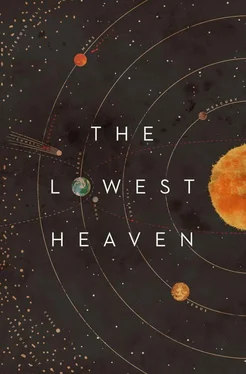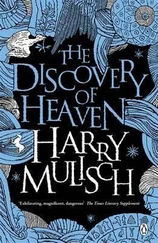People are strange in the Outer System, and the few Others, too, who make their homes there. Some say the Others, those digital intelligences bred long ago by St. Cohen in Earth’s first, primitive Breeding Grounds, have relocated en masse to the cold moons of the outer system, installing new Cores away from human habitation, but whether it is true or not, who can tell? Whatever the truth of all this is, it suffices to say that all jobs on Polyport, directly or indirectly, are linked with the business and worship of cargo, and that some jobs are always in demand.
Shereen apprenticed as a cleaner in the landing port beyond the city, a vast dust-bowl plane where RLVs like busy methane-breathing bees rise and fall from the surface to orbit, there to meet the incoming and outgoing space-going vessels to ferry people and cargo back and forth. She was seconded to Customs Inspections slash Quarantine, scouring ships’ holds for unwanted passengers, the rodents and bacteria, fungus and von Neumann machines; from there she moved dome-side, abandoning her public sector job in favour of the private. She cleaned houses both above- and under-ground, until at last she settled on the dual work for the House of Mirth and the House of Domicile, a work associated, after all, with cargo and religion both.
It is said that Dragon, that enigmatic entity living on the moon Hydra, its body composed of millions of discarded battle dolls, had passed through Polyport on its way from Earth. If so, local historical documentation is nonexistent, and anecdotal evidence spurious. Nevertheless, an uncle of Shereen’s, a Guild-certified cleaner in his own right, used to tell the tale of Dragon’s arrival as though he had known it for truth.
In the story, Dragon’s Core, the hub of it, remained in orbit around Titan, carried as it were in a converted asteroid; and it trailed behind it kilometres-long lines of suspended second- and third-hand Vietnamese battle dolls, strung on wires; while Dragon manifested upon the streets of Polyport in a doll body of weathered humanoid form of little distinction. It was then, said Shereen’s uncle, that Dragon met the woman who had once been One-times-One, then One-times-Two, and was finally a Three-times-Three; but whose name had once been Haifa al-Sahara.
Did Dragon◦– who split itself across a million bodies◦– suggest to al-Sahara a similar possibility? Ask at the House of Mirth, or at the House of Forgetting, and you shall receive no answer. Yet whether it is felt the question too ridiculous to answer, or if, rather, there is a kernel of truth in it, the silence does not say.
Be that as it may. You can read more about the early history of the Houses in Sisters of Titan , by Hassan Sufjan, if you were so inclined or, of course, in Gidali’s classic novel, Three Times Three Is One (adapted by Phobos Studios into a lavish three-part production starring Sivan Shoshanim).
What’s important is that, at the time that Shereen was working at the Houses, trouble had been brewing for some time. And that, one day, a new novice came into service in the House of Mirth.
Or is that important? It was to Shereen, certainly, eventually. It was to the novice, too, whose name was Aliyah. How we assign importance depends on where we ourselves stand in the story. For Shereen, it was a moment of significance, the point in which light breaks through the transparent dome, and Saturn rises. Seeing Aliyah walk into the House of Mirth was like being thirsty, and then being given drink; like having been sick, and suddenly feeling better; and so on and so forth.
Aliyah came into the House of Mirth dressed in the modest jilaabah of the Sisters, in the plain black of the Noviates. Underneath it, Shereen knew, Aliyah would bear the scars and grafts of Noviatehood; while inside the filaments would be growing, burrowing under the skin and showing as fine blue lines under direct white light. Shereen was cleaning unobtrusively in the background. Robots could do some of the work, sure, but robots, or Others, were not welcome in the Houses of the Sisters. And humans were so much more… human. The Sisterhoods rejected the Way of Robot, and the ideal of Translation. They were, for whatever it’s worth, still human.
In a manner of speaking.
Underneath her head scarf, Shereen knew, Aliyah’s head would be shaven, misshaped by augmentation. Only her eyes could be seen, a startling, deep scarlet like the colour of the sky above the port. In her eyes were the storms of Titan. Perhaps it was then that Shereen fell in love. Or perhaps love is merely the illusion of body chemistry and brain software with deep-embedded evolutionary instincts. Though that hardly sounds very romantic.
The poet-traveller Bashō, who had visited Titan, once wrote:
Laf hemi wan samting
I no semak
Ol narafala samting
Which translates, from the Asteroid Pidgin, as: Love is one thing / that is not like / any other thing, and which is as unhelpful as Bash ever got.
Their eyes met across a crowded room…
Though it was not crowded, and that first time Aliyah barely saw Shereen, only perhaps as a reflection in a shiny surface. It is easy to unsee cleaners, they walk like shadows, they are unobtrusive by training.
Shereen, then, watched as Aliyah arrived; and as she was ushered in to the inner sanctum by the Three-times-Three. And she brooded.
It was◦– as has been mentioned◦– a time of tensions in Polyphemus Port. The reasons are arcane and somewhat boring. It could be argued that Three-times-Three is the most stable form of Sisterhood, a linked network, nine minds all linked and working in parallel on a perfect grid.
But there were, at the time, as we’ve said, other forms. The asymmetrical Five-times-Sixes of the House of Forgetting, and the Eight-times-Eights of the House of Domicile◦– the largest Sisterhood on Titan. And these joined forces◦– politically speaking◦– against the older and more established Three-times-Three Sisters of Mirth, Shelter and the House of Heaven and Hell.
There is a lot of politics in the solar system. There is the corporate rule of most of the asteroid belt; the mellow capitalism of such old-established settlements like Tong Yun or Lunar Port; the socialism of the Martian Kibbutzim, or the despotic rule of dozens of obscure space habitats. There is the mind-meld democracy of the Zion asteroid (which had since departed the solar system to destinations unknown), the libertarian anarchy of Jettisoned, the militarism that had led to the Jovian Wars in the Galilean Republics for a time, and so on, and so forth.
Titan was, nominally, one of those places with no clear system in place beyond the benign rule of machines; which is to say, autonomous systems kept the fragile balance of human lives functioning on an essentially hostile world, and the humans, robots, Others, Martian Re-Born, tentacle junkies, followers of Ogko and so on simply got on with whatever it was they were doing, most of which◦– as we’ve said◦– revolved around cargo.
The rise of the Sisterhoods, however, changed things. They were not exactly a religious order, though their business was the transport of cargo and thus assumed religious nature. They were a mixture of business and religion, then, human mind-melds functioning like digital intelligences, their component parts replaced as they grew old and died, but the basic mind kept on, gaining new perspectives and notions with each new cell of a Three-times-Three or a Five-Times-Six. In a world with few genuine Others, and only the occasional robot pilgrim on its way to or from the Robot Vatican on Mars, the Sisterhoods were near unique, and their power had risen as they assumed onto themselves new followers.
Against this background of rising tension, Shereen and Aliyah had fallen in love.
Читать дальше












